ECOLOGICAL ECONOMICS FOR THE ANTHROPOCENE
Ecological Economics for the Anthropocene
An Emerging Paradigm
EDITED BY PETER G. BROWN AND PETER TIMMERMAN

COLUMBIA UNIVERSITY PRESS
NEW YORKColumbia University Press
Publishers Since 1893
New York Chichester, West Sussex
cup.columbia.edu
Copyright 2015 Columbia University Press
All rights reserved
E-ISBN: 978-0-231-54042-1
Library of Congress Cataloging-in-Publication Data
Ecological economics for the anthropocene : an emerging paradigm / edited by Peter G. Brown and Peter Timmerman.
pages cm
Includes bibliographical references and index.
ISBN 978-0-231-17342-1 (cloth : alk. paper)
ISBN 978-0-231-17343-8 (pbk. : alk. paper)
ISBN 978-0-231-54042-1 (e-book)
1. EcologyEconomic aspects. 2. Environmental economics. I. Brown, Peter G. II. Timmerman, Peter.
HC79.E5E25253 2015
333.7dc23
2015009578
A Columbia University Press E-book.
CUP would be pleased to hear about your reading experience with this e-book at .
COVER IMAGE: Courtesy of NASA
COVER DESIGN: Milenda Nan Ok Lee
References to websites (URLs) were accurate at the time of writing. Neither the author nor Columbia University Press is responsible for URLs that may have expired or changed since the manuscript was prepared.
CONTENTS
JON D. ERICKSON
PETER G. BROWN AND PETER TIMMERMAN
PETER TIMMERMAN
PETER G. BROWN
RICHARD JANDA AND RICHARD LEHUN
MARK S. GOLDBERG AND GEOFFREY GARVER
GEOFFREY GARVER AND MARK S. GOLDBERG
MARK S. GOLDBERG, GEOFFREY GARVER, AND NANCY E. MAYO
QI FENG LIN AND JAMES W. FYLES
PETER A. VICTOR AND TIM JACKSON
RICHARD JANDA, PHILIP DUGUAY, AND RICHARD LEHUN
BRUCE JENNINGS
JANICE E. HARVEY
JON D. ERICKSON
Ecological economics began with a rather audacious promise to change the world. It was a promise to ground the study and application of economics within the biophysical realities of a finite world and the moral obligations of a just society; a charge to search for truth across disciplines and begin to erase artificial boundaries between C. P. Snows two cultures of the sciences and humanities; and an agenda for political action emanating from the United Nations Earth Summit in 1992 that billed ecological economics as the science of sustainable development.
I was in graduate school in 1992 and wholeheartedly bought into the vision and course of ecological economics. I devoted my professional life to the development of this transdisciplinary lens on the study and management of human communities embedded in our social and biophysical environments. In 1997, with Ph.D. in hand, I landed one of the first jobs advertising for an ecological economist at Rensselaer Polytechnic Institute. We set out to build the first doctoral program in ecological economics, and in subsequent years I helped found the U.S. Society for Ecological Economics; served on the board of our international society; authored and coauthored the requisite number of ecological economic papers and books to get tenure and then a full professorship in the field of ecological economics; worked with some of the pioneers in our field, including Herman Daly, John Gowdy, and Bob Costanza; and went on to manage the Gund Institute for Ecological Economics at the University of Vermont, which is today one of the main hubs of research, application, and education in ecological economics in North America.
I share my journey as an ecological economist to make a point. When the field was formalized in the late 1980s and early 1990s through the creation of a professional society and journal, people like me were supposed to be incubated, indoctrinated, and infiltrated into society. I did not discover ecological economics midcareer, nor did I transform myself into an ecological economist after tenure. I defined myself as an ecological economist in graduate school. For more than twenty years, I have believed that ecological economics would bring about a major paradigm shift in economics and perhaps the social sciences and humanities more broadly.
The premise of this book is that the revolution got a bit sidetracked. I certainly agree. There are scholars, activists, policy makers, professionals, and citizens from all walks of life that identify strongly with ecological economics (and many even call themselves ecological economists as I do). We are all on an unfinished journey, and it is high time that we take stock of where we are, make course corrections, and get on with changing the world.
This will take some soul-searching. For me, it starts with evaluating the field against some core foundational aspects of ecological economics. Ecological economics was initially framed as the study of the economy grounded in the principles of ecologywhat Herman Daly called for in his 1968 essay On Economics as a Life Science. Today, I would argue, in practice and in perception, ecological economics has largely become the application of mainstream economics (economics as an orthodox social science) to the existing agenda of ecologists and environmentalists, thus in practice facilitating a growth agenda. Much of what gets published in our journal, presented at our conferences, and picked up by the press is what we called in graduate school environmental economicsa subdiscipline of economics applied to environmental problems.
This book is first and foremost about re-embedding the study of the economy within the hard-won physical principles of natural science and through a discourse built more on ethical argument than mathematical formalism. In graduate school, I was convinced that my newfound charge as an ecological economist was to expose the faulty assumptions upon which the house of cards called neoclassical economics was builtparticularly the all-too-convenient myths of the rational-actor model and the market-efficiency hypothesis that it was designed to support. Then, with the growing ranks of ecological economists, we were to build an economics that transcended disciplinary boundariesan economics built on biophysical realities and real human beings (irrational emotions and all) as decision makers; an economics that does not always and everywhere assume that more is better; an honest economics built on scientific integrity and democratic discourse.
Instead, I fear at times we practice a hypocritical economics. We too often expose the inconsistencies between our behavioral assumptions and hard-won, testable facts from other disciplines while we kneel at the altar of the market as the one true path to sustainability. This has particularly been the case in the North American expressions of ecological economics, where the discussion has largely focused on market failure, missing the broader critique of the failure of markets, and the role of nonmarket institutions in moving away from what David Korten has called suicide economics. Institutions matter, and the European brand of ecological economics seems to distinguish itself on at least this point. For example, we have learned from the first generation of payments for ecosystem-services schemes, largely in the tropics, that the role of institutions is critical to successful conservation. Quantifying the economic benefit of nature means little without the institutions in place to assure sustainable and equitable outcomes.

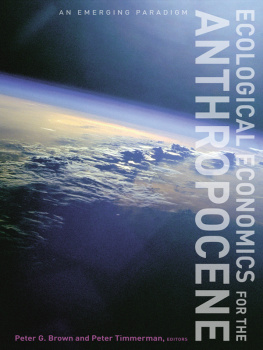
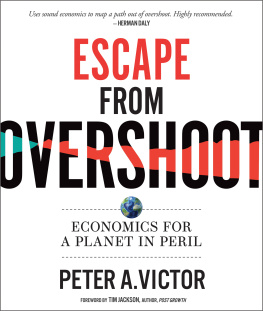
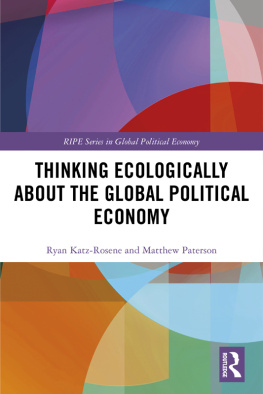

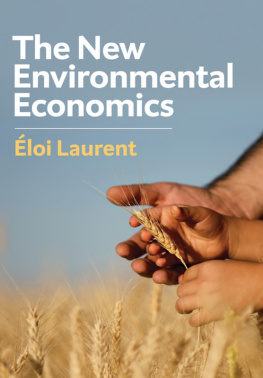
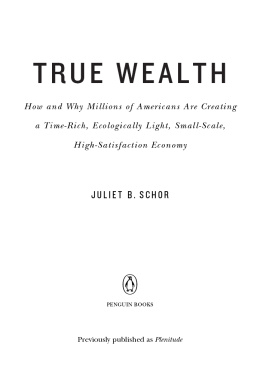
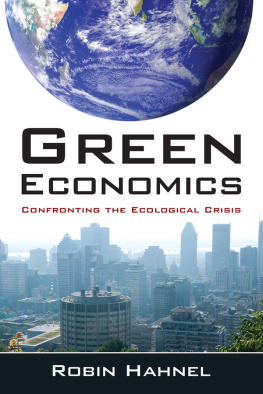
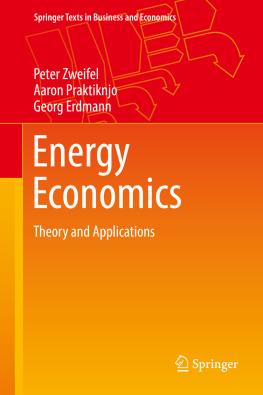

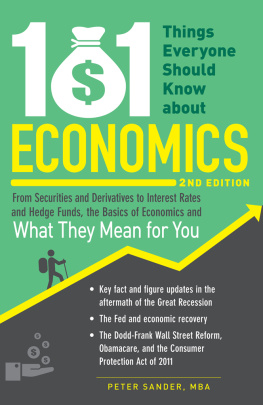

 COLUMBIA UNIVERSITY PRESS NEW YORK
COLUMBIA UNIVERSITY PRESS NEW YORK